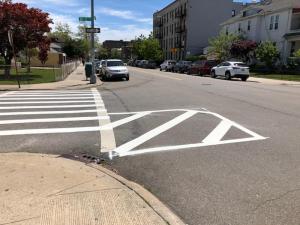City Council Regresses on Street Safety, Weighs Fines for Cyclists
Less than a year ago, the City Council overwhelmingly passed a raft of bills designed to protect New Yorkers from reckless driving. Was it the beginning of a new era, where street safety is taken seriously by city legislators, or was it a fluke? The council could go either way, based on a transportation committee hearing today that considered a new bill to fight the phantom menace of cyclists on cell phones.

Council Member Mark Treyger’s bill to ban handheld cell phone use while bicycling came up for a hearing today at the transportation committee. Texting while bicycling isn’t a safe choice, but neither has it been shown to be a significant factor in serious crashes. Most of the people testifying about the bill urged Treyger to either amend it or focus on dangers that are actually proven to kill and injure New Yorkers on the street.
“While cyclists would benefit from more safety education, drivers account for the overwhelming number of crashes that lead to fatalities or serious injuries on our streets,” testified DOT assistant commissioner Josh Benson. “The Council may want to consider ways to promote expanded safety education for drivers, which will go much farther in making our streets safer.”
Instead of taking the advice, Treyger seems intent on passing the bill after he saw a near-miss involving a texting cyclist in his district last year. But does one anecdote constitute a real problem?
Council Member Antonio Reynoso asked DOT how many pedestrian deaths are caused by cyclists on cell phones. “Zero per year,” Benson said. “We did not find any reports where texting was a factor in bike-related crashes.”
“It’s a piece of legislation that is bringing attention to an issue that doesn’t even exist,” Reynoso said. “It’s very dangerous to do that. ‘We should start asking pedestrians to start wearing reflectors when they cross the street, just in case, because they might be the problem next. The problems are not pedestrians, they are not cyclists. They are vehicles, and I just think that we are fooling ourselves with these pieces of legislation.”
Reynoso contrasted the texting legislation with another bill Treyger supports, which would exempt MTA bus drivers from the Right-of-Way Law. Last year, drivers killed 138 pedestrians in New York City, including nine struck by MTA bus drivers. In eight of those deaths, the bus driver failed to yield to someone with the right of way.
“We’re here talking about improving safety, when the real problem and the real concern are the extremely dangerous vehicles that we have in our streets that are causing deaths,” Reynoso said. “It makes no sense to me that we’re looking to enforce something that doesn’t exist and ignore something that is absolutely a problem.”
After the hearing, Streetsblog asked Treyger if he also supports a ban on texting while crossing the street. While he isn’t proposing a bill now, he didn’t rule it out.
Much of today’s hearing was spent chewing over Treyger’s texting bill, though the committee did vote on some legislation:
- Using car-share to reduce the size of the city’s vehicle fleet: Intro 597-A, introduced by Council Member Ritchie Torres, would require the city to expand use of car-share technology, which has already reduced the city’s fleet by more than 450 vehicles, to further cut the size of its vehicle fleet by two percent a year through 2019 and by one percent in 2020. The bill, which passed 13-0, requires annual progress reports and exempts vehicles “used for emergency response, inspection or enforcement” in the city’s 26,000-vehicle fleet.
- Codifying Bus Rapid Transit planning: Intro 211-A, a long-standing proposal from Council Member Brad Lander, would formalize the city’s BRT plans by requiring DOT to consult with the MTA in developing a BRT blueprint, including routing and cost estimates, with updates every two years. The bill passed 12-0, save for Council Member I. Daneek Miller, who cited his opposition to Select Bus Service between Flushing and Jamaica as the reason for his abstention.
The bills now advance to a vote before the full City Council tomorrow. Three other bills were also on today’s agenda, though they were not up for a vote:
- Codifying Citi Bike data and financial reporting: A pair of bills, one from Lander and another from committee chair Ydanis Rodriguez, would require the city to post bike-share financial information and anonymized trip data online. This information is currently available on the Citi Bike website.
- Civil penalties for bicycle and car theft: Another bill would establish civil penalties, in addition to criminal penalties, between $500 and $1,000 for stealing a bicycle and between $5,000 and $7,500 for stealing a motor vehicle. Bicycle thefts reported to NYPD have risen consistently: 2,894 in 2011, 3,503 in 2012, 4,249 in 2013, and 4,849 last year. So far this year, there have been 532 reported thefts. NYPD attributes the increase to the rising popularity of cycling.
- Bike education courses instead of a fine for first-time bike offenses: Finally, a bill from Treyger would allow cyclists who receive their first traffic ticket to take a bike education course instead of paying a fine. NYPD was generally supportive of the bill, but requested minor changes to clarify that administrative law judges, and not police officers, are responsible for determining the appropriate punishment.

